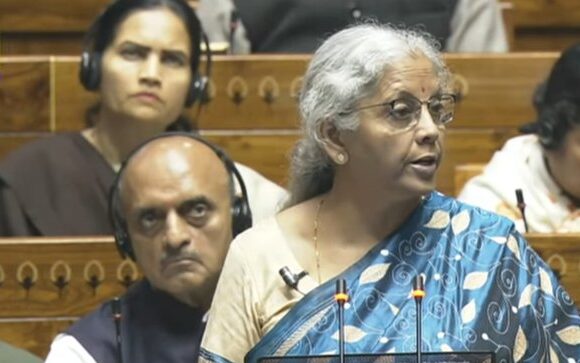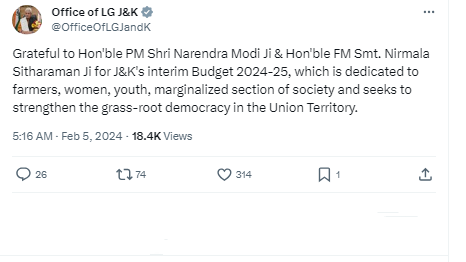Lt. Governor Manoj Sinha lauds the transformative measures outlined in the J&K budget for 2024-25, praising its dedication to diverse segments and foreseeing an investment-friendly environment alongside accelerated industrial growth
BY TAUHEED AHMAD
In a defining moment for the Union Territory of Jammu and Kashmir (J&K), Finance Minister Nirmala Sitharaman presented the Revised Estimates for 2023-24 and the Interim Budget for 2024-25 in Parliament, asserting that the crucial reforms implemented in 2019 paved the way for “path-breaking” measures. The Union Territory Government’s focus on decentralizing governance, promoting inclusive development, and bolstering infrastructure has drawn attention, with key stakeholders applauding the strategic vision outlined in the budget.
Addressing the Parliament, Finance Minister Nirmala Sitharaman emphasized the government’s commitment to decentralizing governance, promoting inclusive development, and enhancing infrastructure. “The crucial reforms undertaken in 2019 enabled path-breaking measures by the Union Territory Government,” she remarked. Sitharaman highlighted the government’s policy of zero tolerance against terrorism while ensuring law and order and implementing initiatives for economic and social development.

The Interim Budget outlines a comprehensive financial landscape and central assistance, with the Union Territory estimating its own revenue at ₹20,867 crore. Crucially, the Central Government has responded with substantial financial assistance, agreeing to provide ₹41,751.44 crore in the current fiscal year and ₹37,277.74 crore in the next fiscal year. This assistance encompasses various facets, including resource gap coverage and equity contribution for hydropower projects.
The budget’s meticulous allocation across sectoral allocation and development priorities signify a targeted approach to address the diverse needs of the Union Territory. Key areas of focus include tap-water connectivity in rural areas, agricultural transformation through the Holistic Agriculture Development Programme, and the rejuvenation of school education infrastructure under the Samagra Shiksha Abhiyan.
Additionally, a significant emphasis on road connectivity, decentralized governance, health infrastructure, and rural housing under various schemes underscores the government’s commitment to holistic development. The allocation of ₹1,271 crore for health infrastructure and ₹1,313 crore for strengthening decentralized governance highlights the significance accorded to these critical sectors.
Welcoming the interim budget of Rs 1.18 lakh crore for J&K

Expressing gratitude to Prime Minister Narendra Modi and Finance Minister Nirmala Sitharaman, Lieutenant Governor Manoj Sinha lauded the budget’s dedication to farmers, women, youth, and marginalized sections of society. Sinha emphasized, “The budget 2024-25 creates an enabling environment for investment & seeks to accelerate industrial growth.”
Taking to Twitter, the Lt Governor conveyed his appreciation, stating, “Grateful to Hon’ble PM Shri Narendra Modi Ji & Hon’ble FM Smt. Nirmala Sitharaman Ji for J&K’s interim Budget 2024-25, which is dedicated to farmers, women, youth, marginalized sections of society, and seeks to strengthen grassroots democracy in the Union Territory.”

Lt Governor Sinha highlighted the pivotal aspects of the interim budget, emphasizing its commitment to fostering rapid economic growth while ensuring inclusivity and sustainability. He underscored the budget’s focus on the swift expansion of the agricultural economy, addressing regional imbalances, and bridging the rural-urban divide.
Furthermore, the budget was lauded for creating an enabling environment for investment, aiming to accelerate industrial growth. Lt Governor Sinha expressed optimism that the budget would lead to increased employment generation, provide support to key investment areas, and foster a thriving start-up ecosystem in the UT.
Enabling Investment Environment and Employment Focus: The budget’s strategic orientation towards creating an enabling environment for investment is apparent, with a clear intent to accelerate industrial growth. The emphasis on generating employment, supporting identified thrust areas for investment, and fostering the start-up ecosystem reflects a forward-looking economic strategy.
Women Empowerment and Social Inclusion: A noteworthy aspect of the budget is its dedicated focus on skill development and employment for women (Nari Shakti). The allocation of resources to ensure benefits of economic growth reach women in rural and urban areas, empowering self-help groups, and facilitating access to resources and networks for women-owned enterprises is a significant step towards social inclusion.
Parliamentary Consideration and Future Implications: As the two Appropriation Bills on the Supplementary Demands for 2023-24 and Vote on Account for 2024-25 are set to be considered by the Lok Sabha and Rajya Sabha, the analytical lens must extend to the potential implications of these financial decisions. The strategic allocations, if effectively implemented, have the potential to reshape the socio-economic landscape of Jammu and Kashmir, fostering sustainable and inclusive development.
The budget, hailed as “path-breaking,” unfolds a meticulous sector-wise allocation that underscores a strategic approach toward inclusive development and economic growth.
Water and Rural Development: A significant allocation of ₹2,959 crore has been earmarked for tap-water connectivity in rural areas under the Jal Jeevan Mission. This allocation includes a substantial ₹532 crore as the Union Territory’s share, signaling a commitment to providing basic amenities to rural communities.
Agriculture and Allied Sectors: The budget allocates ₹934 crore to transform agriculture and allied sectors through the Holistic Agriculture Development Programme (HADP). This includes provisions for the IFAD-funded J&K Comprehensive Investment Plan (JKCIP), emphasizing sustainable agricultural practices and comprehensive rural development.
Education Infrastructure: Rejuvenating school education infrastructure takes center stage with an allocation of ₹1,907 crore under the Samagra Shiksha Abhiyan. This allocation aims to enhance educational facilities, providing a solid foundation for the youth in the Union Territory.
Road Connectivity: Addressing regional imbalances, the budget allocates ₹1,683 crore for PMGSY roads, ₹300 crore for CRF roads, and ₹1,000 crore under the NABARD scheme. This strategic focus on road connectivity aims to bridge the rural-urban divide and spur overall economic development.
Decentralized Governance: Recognizing the importance of decentralized governance, ₹1,313 crore has been allocated to strengthen local governance at the panchayat and urban local body levels. This allocation signifies a commitment to empowering grassroots institutions for effective and inclusive governance.
Health Sector Infrastructure: The health sector receives a substantial boost with an allocation of ₹1,271 crore under the National Health Mission mechanism. This investment is geared towards enhancing healthcare infrastructure and services, ensuring the well-being of the people.
Rural Housing: The Pradhan Mantri Awas Yojana-Grameen scheme is allocated ₹1,093 crore to address rural housing needs. This strategic allocation aims to provide shelter and improve living conditions in rural areas.
Social Security and Women Empowerment: Comprehensive social security coverage is a focal point, with an allocation of ₹1,000 crore for old-aged, widow, and disabled pensions through a saturation approach. Additionally, ₹430 crore has been earmarked for women empowerment interventions, including Ladli Beti and Marriage Assistance.
Hydropower Projects and Infrastructure: A significant allocation of ₹660 crore is dedicated to J&K’s equity in hydropower projects at Ratle, Kwar, and Kiru. This allocation not only supports infrastructure development but also aims to provide a stable revenue source and affordable power.
Industrial Growth and Employment: The budget earmarks ₹400 crore for the construction of industrial estates and related infrastructure, emphasizing an enabling environment for investment and industrial growth. Further, ₹500 crore is allocated for the capitalization of banks, including Cooperative Banks, Rural Banks, and J&K Bank, aiming to support economic activities.
Blurb
Jammu and Kashmir’s 2024-25 Interim Budget unveils a strategic roadmap for inclusive growth. Finance Minister Nirmala Sitharaman, citing reforms since 2019, emphasized decentralization, inclusive development, and infrastructure. The budget outlines a comprehensive financial landscape with substantial central assistance and meticulous sector-wise allocation, addressing crucial sectors like rural development, agriculture, education, road connectivity, decentralized governance, health, and social security. Lieutenant Governor Manoj Sinha lauded its dedication to diverse segments, foreseeing an investment-friendly environment, industrial growth, and employment opportunities. The budget emerges as a path-breaking initiative poised to transform the region’s socio-economic fabric.

Leave a Reply